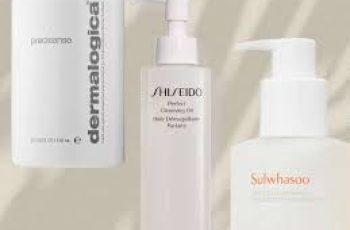
How Your Skin Changes During the Three Phases of Menopause
Menopause is a deeply personal journey, with each woman experiencing it uniquely, but skin changes during the three primary phases are nearly universal and can profoundly impact your skincare needs.
Though the timing and intensity of symptoms may vary from person to person, the phases—perimenopause, menopause, and post-menopause—bring about consistent hormonal shifts that reflect visibly on your skin.
If you have a uterus and are approaching your late 40s or early 50s, it’s almost guaranteed that skin dryness, sensitivity, and a lack of bounce will eventually make an entrance.
Understanding how your skin evolves through each stage of menopause helps you tailor your skincare routine, ensuring that you nurture and protect your skin effectively during this transition.
So let’s break it down and explore what exactly happens to your skin in each of these three stages—perimenopause, menopause, and post-menopause—and how you can care for it wisely.
Perimenopause: The Prelude to Change
Perimenopause is the transitional stage that typically begins in your mid-to-late 40s, though it can start earlier, and it usually lasts anywhere from four to eight years.
During this phase, estrogen and progesterone levels begin fluctuating wildly, leading to menstrual irregularity and triggering a series of skin-related changes that are hard to ignore.
You might start to experience hot flashes, which often show up as intense redness and heat in the face, neck, and chest, causing temporary inflammation in the skin.
For many women, this is also the time when rosacea first appears or becomes more prominent, often mistaken for persistent redness or unexpected breakouts.
Speaking of breakouts, adult acne can make an uninvited return, even if your skin has been clear for decades, due to the hormonal imbalance increasing oil production.
Your previously balanced complexion may suddenly show signs of both oiliness and dehydration, making it hard to know what products your skin really wants or needs.
Dry patches, tightness, sensitivity, and uneven texture become more common, especially around the cheeks, jawline, and forehead, areas that were once smooth and predictable.
The skin’s barrier function weakens, making it more vulnerable to irritation, and this might mean your trusty old skincare routine starts to feel too harsh or ineffective.
Because of slower cell turnover, dullness becomes an ongoing battle, with dead skin lingering longer on the surface and robbing you of the natural glow you once took for granted.
Hyperpigmentation may start to appear more stubborn, especially around the mouth, eyes, and upper lip, as hormonal shifts can trigger melanin production in unpredictable ways.
At this stage, it’s important to begin incorporating ingredients that both soothe and stimulate—supporting barrier repair while encouraging collagen production.
Menopause: The Defining Moment
Although we often think of menopause as a long period, it technically refers to one specific day: the one-year anniversary of your final menstrual period.
Even though it’s just one day on the calendar, the effects on your skin around this point continue to build, and they represent a continuation of what began during perimenopause.
One of the most noticeable changes is skin thinning—both on your face and body—as estrogen, the hormone responsible for skin thickness and elasticity, drops to very low levels.
This thinning can make your skin more fragile, leading to more visible fine lines, sagging, and an overall loss of that youthful bounce and firmness.
You may also notice that wounds or irritations take longer to heal, and bruising happens more easily because the skin lacks the density and support it once had.
Collagen production takes a major hit, declining rapidly during menopause, and this directly contributes to deepening wrinkles and sagging contours.
Because cell turnover slows significantly, your skin may begin to look dull or tired, and even the best highlighters won’t restore that natural radiance without a little help.
Dryness becomes even more intense due to reduced natural oil production and a drop in skin humectants—those molecules that draw and retain moisture.
Your skin might feel tight, flaky, and parched more often, particularly around the eyes, mouth, and neck, areas that are especially prone to dryness and wrinkling.
Irritation may also become more common as your skin becomes less tolerant of active ingredients, fragrances, or environmental stressors like cold winds or pollution.
At this stage, choosing gentle yet effective skincare becomes more important than ever—you’ll want to feed the skin without overwhelming it.
Hydration, nourishment, and firming ingredients should become staples in your daily routine, helping to offset the changes you’re seeing and feeling.
Post-Menopause: The New Normal
Post-menopause is the stage that follows menopause and continues for the rest of your life, with estrogen levels stabilizing but remaining at consistently low levels.
Many of the symptoms you experienced during perimenopause and menopause—such as hot flashes, mood swings, and night sweats—tend to subside or disappear entirely.
However, skin dryness, thinning, sagging, and loss of elasticity often remain persistent concerns, and without proper care, these issues can accelerate.
Your skin type may now be entirely different from what you once knew—what was once oily may now be dry, what was once firm may now feel soft or loose.
Sebum production slows drastically, leading to fewer breakouts but also less protection from environmental aggressors that compromise your skin’s barrier.
This increased vulnerability means that your skin may feel more reactive, and long-term hydration becomes critical for maintaining comfort and resilience.
Fine lines that were once faint can deepen into wrinkles, especially around the mouth, eyes, and forehead, as repeated muscle movement and collagen loss take their toll.
Uneven tone and pigmentation from years of sun exposure or hormonal shifts may become more visible, so brightening and smoothing ingredients are helpful here.
Your skin care routine should now focus on preserving and reinforcing your skin’s integrity, with targeted treatments to boost firmness, hydration, and brightness.
Top Skincare Ingredients for Menopausal Skin
Let’s talk about ingredients—what works best for menopausal and post-menopausal skin to restore vitality and keep your complexion comfortable and glowing.
Retinoids are often considered the gold standard for aging skin, as they help increase cell turnover, boost collagen, and reduce the appearance of wrinkles and sun damage.
Choose a formula that suits your skin sensitivity—retinol for beginners, or tretinoin for more advanced users—always paired with a good moisturizer to prevent irritation.
Peptides are powerful signaling molecules that help your skin rebuild collagen and elastin, offering support to sagging areas and improving the texture and resilience of your face.
They’re especially beneficial in serums or creams designed to target loss of firmness and work well alongside hydrating and soothing ingredients.
Glycerin is a deeply hydrating humectant that draws water into the skin and locks it in, helping to maintain softness and plumpness without any greasy residue or irritation.
It’s ideal for sensitive skin types that react to heavier ingredients and is found in many cleansers, toners, and moisturizers.
Hyaluronic Acid is another must-have hydration booster—it holds up to 1,000 times its weight in water and helps restore that dewy, youthful bounce to parched and depleted skin.
Apply it on damp skin and seal it in with an occlusive moisturizer to make the most of its water-binding powers.
Incorporating ceramides into your routine is also a smart move—these lipids help rebuild the skin barrier and prevent moisture loss, keeping dryness and flaking at bay.
Look for ceramide-rich creams and moisturizers that can be used both morning and night to enhance comfort and resilience.
And don’t forget niacinamide, a multitasking hero that improves texture, fades pigmentation, strengthens the skin barrier, and calms inflammation, making it perfect for mature skin.
And Finally—Sunscreen. Every Single Day.
No matter your age or the season, daily sunscreen is non-negotiable—it’s the most effective way to slow down skin aging and protect your skin from further damage.
Choose a broad-spectrum SPF of at least 30, preferably one with moisturizing ingredients to offer dual benefits of hydration and UV protection.
Reapply every two hours if you’re outside, even on cloudy days, and don’t forget often-missed areas like the neck, chest, ears, and hands.
In Summary
Menopause is a journey that transforms your body and your skin, and it’s one that deserves thoughtful attention and targeted care.
From the hormonal chaos of perimenopause to the stabilization of post-menopause, your skin will go through many changes—but with the right knowledge, you can stay ahead of them.
Hydration, nourishment, barrier support, and collagen-boosting actives are key components of a skincare routine that supports you through all stages of menopause.
With the right ingredients and consistency, you can maintain glowing, resilient, and healthy-looking skin well into your golden years.
So brew yourself that cuppa, take a breath, and embrace the next chapter—your skin’s story is far from over, and you’re more equipped than ever to care for it beautifully.


